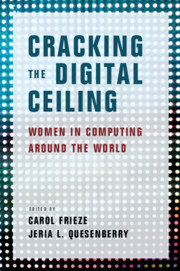Book contents
- Cracking the Digital Ceiling
- Cracking the Digital Ceiling
- Copyright page
- Contents
- Contributors
- Acknowledgments
- Introduction
- Part I Global Perspectives
- Part II Regional Perspectives
- Part III Cultural Perspectives from the United States and Europe
- Part IV Cultural Perspectives from Asia-Pacific
- 14 More Chinese Women Are Needed to Hold Up Half the Computing Sky
- 15 How the Perception of Young Malaysians toward Science and Mathematics Influences Their Decision to Study Computer Science
- 16 Women as Software Engineers in Indian Tamil Cinema
- 17 Women in Computing Education
- 18 Challenging Attitudes and Disrupting Stereotypes of Gender and Computing in Australia
- Conclusion
- Notes
- Index
- References
17 - Women in Computing Education
A Western or a Global Problem? Lessons from India
from Part IV - Cultural Perspectives from Asia-Pacific
Published online by Cambridge University Press: 10 October 2019
- Cracking the Digital Ceiling
- Cracking the Digital Ceiling
- Copyright page
- Contents
- Contributors
- Acknowledgments
- Introduction
- Part I Global Perspectives
- Part II Regional Perspectives
- Part III Cultural Perspectives from the United States and Europe
- Part IV Cultural Perspectives from Asia-Pacific
- 14 More Chinese Women Are Needed to Hold Up Half the Computing Sky
- 15 How the Perception of Young Malaysians toward Science and Mathematics Influences Their Decision to Study Computer Science
- 16 Women as Software Engineers in Indian Tamil Cinema
- 17 Women in Computing Education
- 18 Challenging Attitudes and Disrupting Stereotypes of Gender and Computing in Australia
- Conclusion
- Notes
- Index
- References
Summary
Graduation trends in the last twenty-five years show that majors in computing-related fields have had low popularity among female students in the United States and Europe. For instance, in 2015, US women earned a mere 18% (9,209) of bachelor’s degrees in computer science (CS), which is less than the number earned in 1985 (14,431) (National Science Board, 2018). Similarly, in Europe women represented 16.7% of total graduates in information communication technology (ICT) in 2016 (European Commission, 2018). Low participation of women in computing education has been a pressing problem in Western countries. Gender diversity in computing is imperative as it will increase the skilled labor force pool, enrich innovation, and foster social justice. Most importantly, there is a high demand for people with computing skills. The number of ICT specialists in the European Union grew by 36.1% from 2007 to 2017, more than ten times as high as the increase (3.2%) for total employment (Eurostat, 2018). Employment in computing-related occupations in the United States is projected to grow 13% from 2016 to 2026, which is faster than the average for all occupations. This is expected to add about 557,100 new jobs (US Department of Labor, 2017). Often such growing needs are met by foreign skilled workers, mostly from Asian countries. It is, therefore, no surprise that a number of governmental and corporate initiatives exist in the United States and in Europe to empower students with the computing skills to thrive in a global economy.
- Type
- Chapter
- Information
- Cracking the Digital CeilingWomen in Computing around the World, pp. 299 - 310Publisher: Cambridge University PressPrint publication year: 2019
References
- 2
- Cited by

